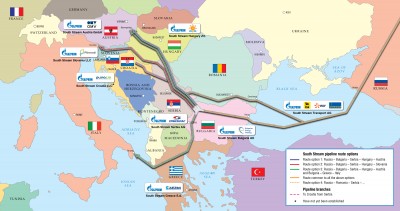The European Union in Crisis. The Geopolitics of Russia-EU Pipeline Corridors

When the special interests who created and direct the agenda of the European Union disagree with member states, the true nature of this supranational enterprise becomes painfully apparent – one of dictatorial special interests pursing regional policy that benefits none of its individual member states. No example of this can be clearer than the dispute that has emerged over the construction of Russia’s South Stream natural gas pipeline set to run through Bulgaria, Serbia, Hungary, and Italy.
The pipeline produces a large number of benefits for each of the nations it passes through, as well as for energy markets on either end of the pipeline. For the people and governments of these nations set to benefit most from the pipeline, the deal is an attractive, long-term investment. For the special interests that have created and currently direct the EU – on the other hand – it poses as a direct threat to their designs of continued expansion and corporate-financier hegemony beyond the collective borders of today’s EU.
For the hegemon, coexistence and collaboration are not options – thus the benefits of the South Stream pipeline escape them. Instead, these hegemonic special interests seek to control their own pipeline and energy markets on either side of it, and this can be seen developing along several fronts including the Southern Corridor Project, beginning in Azerbaijan along the Caspian Sea.
Energy and foreign policy expert Sinan Ulgen of the US government and corporate-financier funded Carnegie Europe think-tank complained about the disparity between the EU Commission’s stance, and that of individual EU member states in an Anadolu Agency (AA) article titled, “Russian South Stream gas pipeline divides EU,” stating:
“…the EU’s main concern about South Stream is that the project would increase its dependence on Russian gas. Last year a third of its consumed gas was supplied by Russia.
Additionally the AA article would state:
While the European Commission opposes Russia’s South Stream gas pipeline project, certain EU countries like Austria and Italy continue to openly support the world’s most expensive pipeline project, which aims to transport Russian gas by bypassing Ukraine.
For the last two years, Russia has signed bilateral agreements with Italy, Bulgaria, Serbia, Hungary, Greece, Slovenia, Austria and Croatia for the construction of the South Stream gas pipeline, which is estimated to cost nearly US$40 billion according to the Moscow Times. Gazprom recently announced however that it was abandoning construction of the Italian portion of the pipeline.
These agreements were deemed a breach of EU anti-trust law by the European Commission in December. And, in April, following the annexation of the Crimean peninsula by Russia, the European Parliament voted for the South Stream project to be stopped.
AA would also cite another corporate-financier funded think tank, Chatham House – also complaining about EU members pursuing their own interests in contradiction to the EU Commission’s dictates. The unelected EU Commission appears to be pursing its own extraterritorial geopolitical pursuits ahead of those of the individual member states and their respective populations. That corporate-financier funded “think tanks” are focused on this “divide” and championing the EU Commission’s agenda over that of the individual EU members it allegedly represents fully exposes the EU for what it truly is, a dysfunctional supranational dictatorship.
And what is done in the name of the EU by its institutions like the EU Commission, which admittedly does not represent the best interests or desires of those it claims to represent, unfortunately and perhaps unfairly reflects on the EU as a whole. For example, and as part of the energy debate, the current EU support of the regime occupying Kiev, Ukraine, taints all of Europe, even as many EU member states attempt to move cautiously or even in opposition to the greater agenda the EU Commission and others are pursuing.
While the EU promotes itself as a bastion of freedom, stability, and prosperity, it appears increasingly more like a hegemonic bloc, dictating to, rather than acting as a representative of, the European people. The slogan “Toward a Europe Whole and Free” rings hollow when the EU Commission begins dictating policy to individual states, and curtailing progress that benefits both individual nations and their people.
The EU, in this light, appears more of an autocratic oligarchical consolidation of regional power and resources, not a democratic collaboration between nations. A slogan like “Toward a Europe Whole and Free” appears then to represent Europe, but only from the perspective of special interests seeking to loot the region collectively, rather than nation-by-nation. The dysfunction and dictatorial nature of the EU Commission and other apparatuses within the supranational bloc serve as a cautionary example for other nations seeking to construct their own alliances – from Asia’s ASEAN-AEC (Asian Economic Community), to regional alliances between Russia, China and with nations along their peripheries.
Alliances that include obligations that usurp national sovereignty are not alliances at all, they are hegemonic infiltration by special interests who would rather see a village place their valuables in a single safe for them to crack and loot, rather than take the time and trouble to rob each individual home. Europe must decide whether it will continue along a path of internal conflict with its alleged EU representatives tainting their collective populations, cultures, and histories, or reform the EU into an institution that allows collaboration and national sovereignty to exist in tandem.
Tony Cartalucci, Bangkok-based geopolitical researcher and writer, especially for the online magazine “New Eastern Outlook”.

